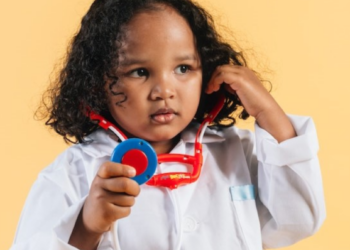“Main Character Syndrome” is a term gaining attention in discussions about children’s behavior, and it’s making parents wonder: Does my child have it? This phenomenon refers to when a child believes they are the central figure in every situation, often acting as if the world revolves around them. While this self-centeredness can be a natural part of development, some experts suggest it can also reflect deeper issues. Keep reading for ways to identify if your teen has Main Character Syndrome.

“Main character syndrome isn’t a clinical term, but it’s a phrase that’s caught on to describe when someone acts like the star of life’s movie and everyone else is just part of the supporting cast,” Caitlin Slavens, MC, a child psychologist at MamaPsychologists told Parents.com in a recent interview.
“For teens, this might mean seeing themselves as the center of attention or narrating their lives like they’re in a TikTok montage.” According to Slavens, main character syndrome is not inherently a bad thing. “But it can disconnect [teens] from reality or other people’s feelings when it becomes excessive.”

In a world shaped by social media and celebrity culture, understanding Main Character Syndrome is becoming more important for parents hoping to foster a sense of humility, collaboration, and kindness in their children. Below are some identifiers of MCS according to the experts.
- Displaying exaggerated storytelling about personal experiences
- Focusing intensely on appearance and self-presentation
- Centering conversations and events around themselves
- Being reluctant or unable to engage in others’ experiences or emotions
- Presenting a curated online presence that prioritizes perfection or drama Posting or narrating their life online as if it’s a reality show
- Making decisions around “storylines”
- Finding it difficult to recognize that others have their own experiences or perspectives
- Overdramatizing or distorting minor events to fit their “main character arc”

Shari B. Kaplan, LCSW, a licensed clinical social worker and clinical director at Cannectd Wellness says that MCS “… can manifest as a heightened focus on self-presentation, often fueled by the narrative-driven culture of social media. While this may be part of normal adolescent development as they form their identity, it can veer into unhealthy territory when empathy and awareness of others diminish.”
She concluded, “This can be prevented however, with the right type of support in early childhood with a parent’s empathy and support toward a child’s experience of emotions such as fear, sadness, and disgust.”
What can parents do if they recognize these signs in their teens? Kaplan offers the following suggestions to parents:
- Encourage self-awareness: Help teens understand the difference between confidence and self-centeredness.
- Promote balance: Foster activities that emphasize teamwork, community involvement, and empathy.
- Model authenticity: Show teens the importance of balancing online personas with real-life connections and vulnerabilities.
- Foster critical thinking about social media: Encourage discussions about the curated nature of social media and the unrealistic standards it often promotes.
- Build resilience: Help teens develop self-esteem rooted in character, values, and accomplishments rather than external validation.
As the experts have suggested, Main Character Syndrome in teens can be a natural part of their development as they explore their identity, it’s important for parents to guide them toward empathy and a sense of balance. Encouraging self-awareness, fostering healthy relationships, and promoting collaboration can help teens develop a more well-rounded perspective, ensuring they grow into considerate individuals who understand the importance of shared experiences and community.







